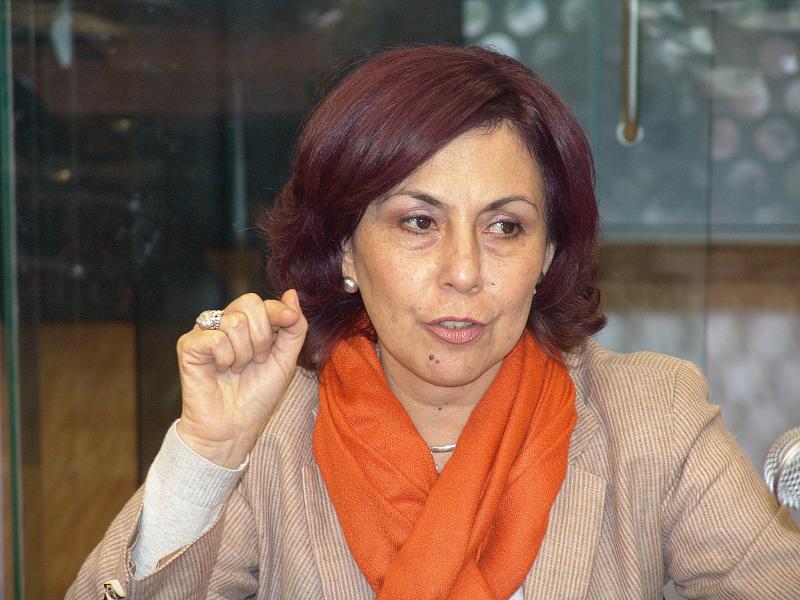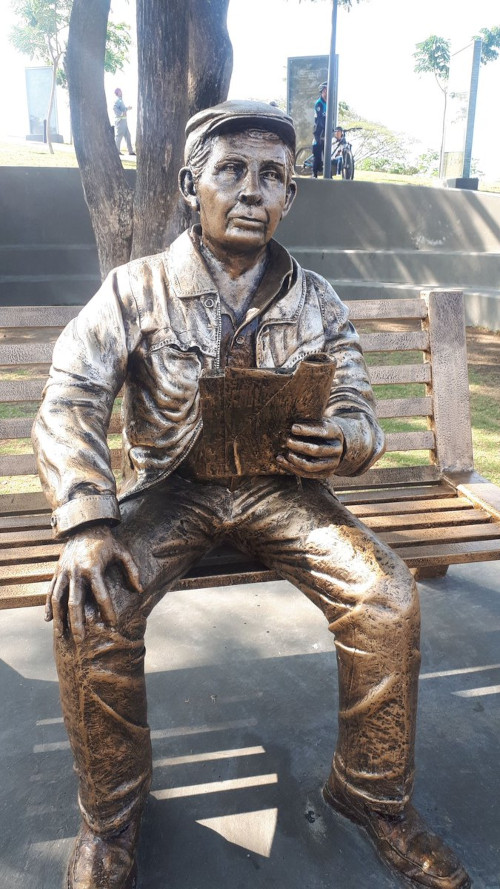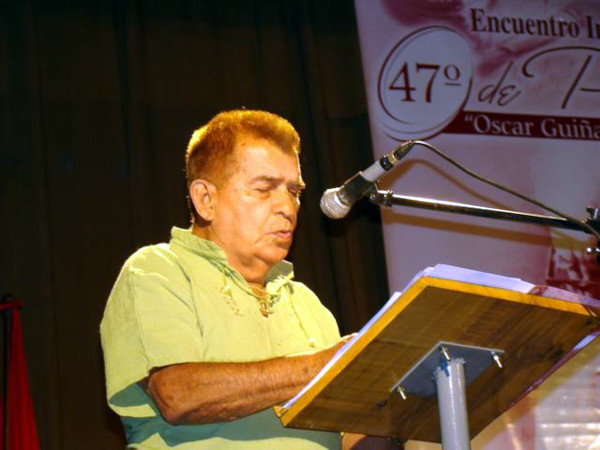Horacio Hidrovo Peñaherrera (Santa Ana, June 24, 1931 – June 9, 2012) was an Ecuadorian poet, writer, professor, cultural promoter, former mayor of Portoviejo, and president of the House of Ecuadorian Culture in Manabí. A professor of literature at the Universidad Laica Eloy Alfaro de Manabí, he authored over 20 works across genres, including poetry, novels, and essays, with some translated into English and Portuguese. In 2009, he was awarded the prestigious Eugenio Espejo Prize for Cultural Activities. He was the son of the celebrated poet Horacio Hidrovo Velásquez (1902-1962).
Early Life and Education
Horacio Hidrovo Peñaherrera was born on June 24, 1931, in Santa Ana, Manabí, Ecuador, into a family deeply connected to literature and culture. His father, Horacio Hidrovo Velásquez, was a celebrated poet, which greatly influenced the younger Hidrovo’s literary trajectory. He completed his early education at the Tiburcio Macías School in Portoviejo and attended the Colegio Nacional Olmedo, where he earned his high school diploma. Hidrovo later pursued higher education at the University of Guayaquil, earning a degree in Social Sciences from the Faculty of Jurisprudence. Additionally, he obtained specialized training as a professor in Literature and Spanish from Ecuador’s Ministry of Education.
Personal Life
Hidrovo’s personal life was intertwined with his passion for literature and education. He shared a deep connection with his native region, Manabí, and sought to preserve its cultural heritage throughout his life. He was married and had children, including Tatiana Hidrovo Quiñónez, a historian who contributed to the family’s cultural legacy. Hidrovo’s home in Portoviejo, known as the Casa de Horacio, became a symbol of his devotion to culture and served as a repository of photographs, articles, and texts about the history of Manabí.
Literary Career
Horacio Hidrovo Peñaherrera had a prolific and diverse literary career spanning poetry, novels, essays, and cultural promotion. His early work included the poetry collection Dimensión del dolor (1951), and his literary voice evolved to reflect his deep connection to the Montubio culture and the natural beauty of Manabí. His works, such as La montaña (2003) and La maravillosa sensación de vivir (2001), encapsulated his rural upbringing and the struggles of the Manabí people.
As a poet and novelist, Hidrovo published notable works including Jinetes en la noche (1948), La usurpación de la tierra en América Latina (1991), and Los pájaros son hijos del viento (1987). His writing was characterized by a commitment to social justice, often addressing the themes of land rights and the preservation of regional identity, as seen in works like Esperanza y desesperanza del montubio manabita (1991). His novels, including La mujer que nació así (1982) and Se vende una ciudad (1979), further cemented his reputation as a writer deeply engaged with the social and cultural issues of Ecuador.
Cultural Promotion and Teaching
Beyond his writing, Hidrovo was a passionate cultural promoter. He dedicated much of his life to fostering Ecuadorian traditions, especially those of his native Manabí. He served as Director of Culture at the Universidad Laica Eloy Alfaro de Manabí, where he also taught literature. Through this role, he sought to strengthen the oral traditions, theater, and music of the region.
He was instrumental in organizing cultural events such as the Festival de la Flor de Septiembre, which aimed to highlight Ecuadorian and Latin American culture. His international work included cultural diplomacy in countries such as Brazil, Venezuela, and Uruguay, where he advocated for Ecuador’s cultural heritage on a global stage.
Awards and Recognitions
Horacio Hidrovo Peñaherrera received numerous prestigious awards throughout his life in recognition of his contributions to literature and culture. These included:
- Benjamín Carrión National Award, National Council of Culture, Quito.
- Ismael Pérez Pazmiño National Poetry Competition Award, newspaper El Universo.
- National Decoration for Cultural Merit; government Dr. Rodrigo Borja.
- National Decoration for Literary Merit; president Oswaldo Hurtado.
- National Award for Cultural Merit; president Sixto Durán.
- Decoration of the National Congress; President Fabian Alarcón.
- 2009 National Eugenio Espejo Award; President Rafael Correa.
- Eloy Alfaro decoration. Provincial Council of Manabí.
- Best Citizen Award; Municipality of Portoviejo.
- Citizen Merit Award; Municipality of Santa Ana.
These accolades underscored his impact not only as a literary figure but also as a cultural ambassador for Ecuador.
Legacy and Death
Horacio Hidrovo Peñaherrera passed away on June 8, 2012, in Portoviejo, after battling a neurological illness. His death marked the loss of one of Ecuador’s most beloved poets and cultural advocates. His works, which have been published in various countries, including Canada, Uruguay, and Peru, continue to influence generations of writers and cultural enthusiasts.
Hidrovo’s literary legacy is deeply rooted in his love for the people and landscapes of Manabí. His home, the Casa de Horacio, remains a cultural landmark in the region, embodying his lifelong commitment to preserving and promoting Ecuadorian culture.
Videos
Interview with Horacio Hidrovo Peñaherrera Part 1
Interview with Horacio Hidrovo Peñaherrera Part 2
Pictures



Works
- El montonero de Montecristi (1992)
- Jinetes en la noche (1948)
- Historia de la literatura manabita (1974)
- Se vende una ciudad: novela (1979)
- La usurpación de la tierra en América Latina (1991)
- Esperanza y desesperanza del montubio manabita (1991)
- Tauras o muertos que estan vivos (1985)
- Dimensión del dolor: poesía (1951)
- La mujer que nació así: novela (1982)
- Canto junto al fuego de los siglos (1978)
- Manzanas para los niños del mundo: poesía (1973)
- Los pájaros son hijos del viento: poesía (1987)
- La danza de los ángeles (2004)
- La novela (1975)
- La montaña (2003)
- Las huelas de tus sandalias (1974)
- La soledad es un domingo largo (2007)
- La novela manabita y su identidad regional: ensayo (1979)
- Album fotográfico de Manabí (1998) with Tatiana Hidrovo Quiñónez
- La maravillosa sensación de vivir (2001)
References
- Wikipedia, “Horacio Hidrovo Peñaherrera.” Retrieved on October 4, 2024. Click to view.
- Autores Manabitas Blog, “Horacio Hidrovo Peñaherrera.” Retrieved on October 4, 2024. Click to view.
- Letralia, “Murió el escritor ecuatoriano Horacio Hidrovo Peñaherrera.” Retrieved on October 4, 2024. Click to view.
- El Comercio, “Falleció el poeta manabita Horacio Hidrovo Peñaherrera.” Retrieved on October 4, 2024. Click to view.
- Mundo Poesía, “Horacio Hidrovo Peñaherrera.” Retrieved on October 4, 2024. Click to view.
- El Universo, “Luto en Portoviejo por la muerte del poeta Horacio Hidrovo Peñaherrera.” Retrieved on October 4, 2024. Click to view.
- El Telégrafo, “Manabí llora la partida de Horacio Hidrovo Peñaherrera.” Retrieved on October 4, 2024. Click to view.

